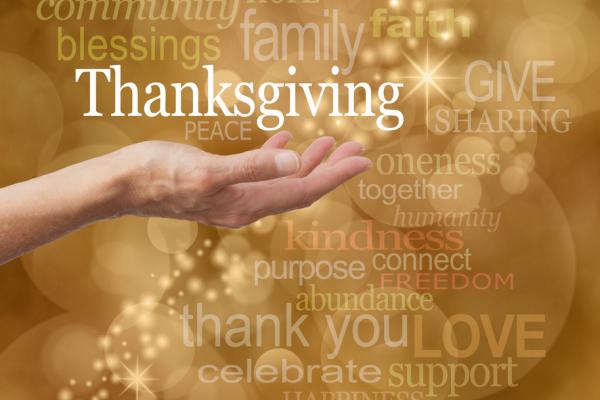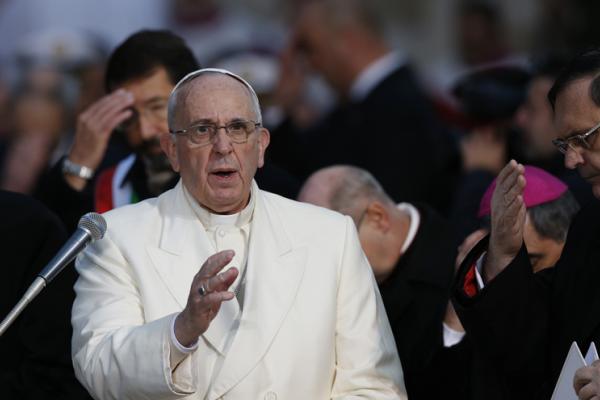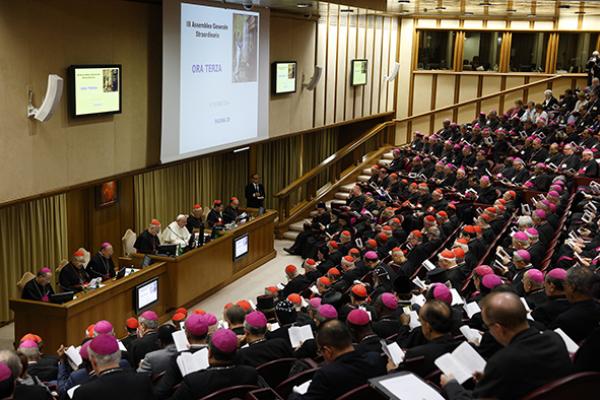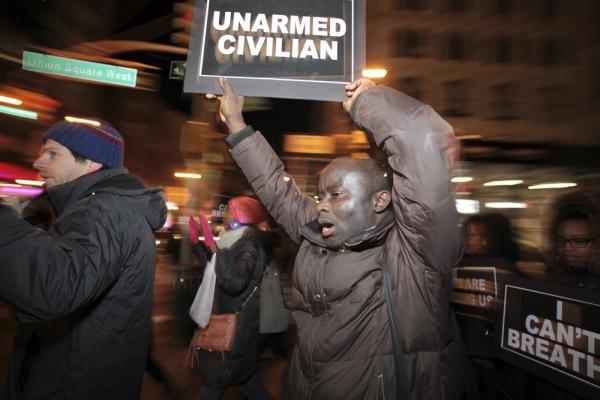I'm grateful for the warm, safe shelter of my home when there are 610,042 experiencing homelessness on any given night in the U.S.
I’m grateful for more than enough to eat when there are 805 million people in the world do not have enough food to lead a healthy active live.
I’m grateful that I have clean drinking water when over 3.4 million people die each year from water, sanitation, and hygiene-related causes.
I’m grateful that I have good health when so many people do not have access to decent medical care, like the 5,459 people who have died from Ebola this year, and the millions more who die each year from preventable diseases.
I’m grateful I have clothing to wear when in the poorest of places, the lack of proper clothing costs lives, and hundreds of millions still live in conditions of material deprivation.
I’m grateful for my freedom when the U.S. had 1.57 million inmates behind bars, the highest percentage of a population of any developed country in the world.
I’m grateful for my citizenship when there are over 11 undocumented immigrants in the U.S. living in the shadow of constant fear.
But I’m especially grateful for the people I know, and the ones I don’t, that are working for justice and peace; a world where all our brothers and sisters have the basic necessities of shelter, food, clean water, decent medical care, and warm clothing. A world where every human being’s dignity is respected and valued. A world Jesus called the Kingdom of Heaven.
Advent is a time for stories. In my childhood, these weeks were filled with Sunday school pageants, beautifully illustrated children's books, and swapping out Legos for the figurines in my mom’s Nativity collection. My favorite part of the Advent story was always the gathering of unlikely companions — magi, shepherds, angels, and a menagerie of farm animals. This year, I find the Advent story accompanied by another, and it starts like this:
Gold, frankincense, myrrh: precious gifts carried by three magi for the King of kings and Lord of lords. Gold, coltan, diamonds: precious gifts of Creation held in the earth of Congo, taken by the "kings" of powerful nations for the commodities of their people. Coltan alone can be found in the cell phones, hearing aids, and prosthetic devices we use in the West every day. These gifts have become a curse with the massacre of over 5.5 million Congolese, numbers nearly equal to the Holocaust. Yet Congo’s conflict remains mostly silent.
An outside watchdog group hired to investigate sex abuse claims at Bob Jones University issued its 300-page report on Dec. 11, concluding that the conservative Christian school responded poorly to many students who were victims of sexual assault or abuse.
Bob Jones, with about 3,000 students at its campus in Greenville, S.C., tapped Lynchburg, Va.-based GRACE (Godly Response to Abuse in the Christian Environment) in November 2012 to investigate claims about sexual assualt. During its two-year investigation, GRACE interviewed 50 individuals who self-identified as victims of sexual abuse.
Some of those students claimed they were victims on campus; others said they were dealing with child sexual abuse but received a poor reception from campus officials as they struggled with their past.
The school’s teachings on sin, forgiveness, discipline, and justice shaped how Bob Jones University responded to sexual assault, the report argues.
“As a result of the school’s poor responses, many of these students were deeply hurt and experienced further trauma,” a press release from GRACE states.
The Buffalo Bills cheerleaders are advised by management on which type of feminine product they should use for their menstrual cycle. They are told that they cannot wear clips or tie backs in their hair. They have been asked to perform backflips on demand at an annual golf tournament where men placed bets on which Buffalo “Jill” would ride in his golf cart.
For all these imposed regulations and for hundreds of hours of work, members of the NFL Buffalo “Jills” Cheerleading Squad did not receive a penny of wages.
In April, five former Jills cheerleaders filed a lawsuit in the New York Supreme Court against the NFL franchise for "exploiting the women by failing to pay them in accordance with New York State minimum wage laws."
The worst part of this is: I don’t care.
When I was growing up I never wanted to be a cheerleader. I barely had a Barbie doll. I raced my brother’s Big Wheel on foot. I never had the desire to stand on the sidelines and cheer for other people, namely men, that were considered more athletic than myself.
So when I heard the news of the Jills’ unfair treatment, my personal sympathy level was somewhat low. They wanted to be cheerleaders, right? They signed up to wear short skirts and tight tops and dance in front of millions of people — they didn’t have to do that.
One commentator on the Jills’ lawsuit said, “Nobody forced them to be cheerleaders. They weren't enslaved. Stop with the pity party.”
And there lies the rub. What’s really at the root of these issues?
Rolling Stone is not the only one throwing sexual abuse victims under the bus these days. An alarming report released today reveals that Bob Jones University, a historically fundamentalist Christian college, failed to support nearly 40 victims of sexual abuse over four decades.
In January 2013, Bob Jones University hired GRACE (Godly Response to Abuse in the Christian Environment) to conduct an independent investigation of the college’s response to sexual abuse allegations.
The report states that BJU officials were not adequately prepared or trained to counsel victims appropriately, often treating victims as blameworthy for their abuse or sexual assault experienced during childhood or adulthood.
In a video statement recorded yesterday, BJU President Steve Pettit issued an apology to students and faculty:
On behalf of Bob Jones University, I would like to sincerely and humbly apologize to those who felt they did not receive from us genuine love, compassion, understanding, and support after suffering sexual abuse or assault. We did not live up to their expectations. We failed to uphold and honor our own core values. We are deeply saddened to hear that we added to their pain and suffering.
The release of a 600-page executive summary of the CIA torture report on Tuesday gave confirmation and imagery to many of our saddest suspicions and vague understandings of the CIA’s use of torture. The report, conducted by the Senate Intelligence Committee between 2009 and 2013, reveals that the U.S. carried out post-9/11 “enhanced interrogation techniques” in an ineffective and fear-fueled effort to prevent terrorism. In an attempt to protect our nation, we lost our values, and then tried to destroy the evidence. Still, many shameful specifics are now public knowledge:
Interrogators have exposed detainees to dark, cold isolation, forced rectal feedings, threats to family members, simulated drowning, 180 hours of sleep deprivation, and much more. The Justice Department still hasn’t pressed any federal charges.
This government transparency is new, but the sins are old. Sojourners has advocated for the end and exposure of U.S. torture techniques for years. Take a look at the Sojourners articles below to learn more about the effects of the program and the dreary history that precipitated the report.
When Pope Francis this month wanted to highlight his appointment of several women to a blue-ribbon theological commission, he called the female theologians “strawberries on the cake.”
Yikes.
Two weeks earlier, when the pontiff gave a speech to the European Parliament, he used another lady-based analogy, this time underscoring the continent’s demographic decline and cultural crisis by comparing Europe to a grandmother who is “no longer fertile and vibrant.”
Ouch.
Yes, Francis is a veritable quote machine, tossing off-the-cuff bon mots that the public finds enormously appealing in large part because they are coming from a Roman pontiff — not an office known for its improv routines.
But when he speaks about women, Francis can sound a lot like the (almost) 78-year-old Argentine churchman that he is, using analogies that sound alternately condescending and impolitic, even if well-intentioned.
The stories of young black men being killed by white police are sparking a national conversation. However, public responses to these painful stories reveal an alarming racial divide. From an unarmed teenager killed in Ferguson, Mo.; to a 12 year-old boy shot dead in Cleveland; to a white police officer on video choking a black man to death in New York City; and a startling series of similar stories from across the country and over many decades — our reactions show great differences in white and black perspectives.
Many white Americans tend to see this problem as unfortunate incidents based on individual circumstances. Black Americans see a system in which their black lives matter less than white lives. That is a fundamental difference of experience between white and black Americans, between black and white parents, even between white and black Christians. The question is: Are we white people going to listen or not?
White Americans talk about how hard and dangerous police work is — that most cops are good and are to be trusted. Black Americans agree that police work is dangerously hard, but also have experienced systemic police abuse of their families. All black people, especially black men, have their own stories. Since there are so many stories, are these really just isolated incidents? We literally have two criminal justice systems in America — one for whites and one for blacks.
Are there police uses of force that are understandable and justifiable? Of course there are. If our society wasn’t steeped in a gun culture, many of these shootings could be avoided. But has excessive, unnecessary, lethal force been used over and over again, all across the country, with white police killing unarmed black civilians? Yes it has, and the evidence is overwhelming. But will we white people listen to it?
Pope Francis used his weekly audience Dec. 10 to challenge media reports of “clashes between factions” at the recent bishops’ synod on family issues.
“Some of you have asked me if the synod fathers fought,” Francis said. “I don’t know if they ‘fought,’ but they spoke forcefully. This is freedom. This is just the kind of freedom that there is in the church.”
In a bid to set the record straight, the pope acknowledged the extensive media coverage of the global gathering in October and likened it to “sports or political coverage.”
“They often spoke of two teams, pro and con, conservatives and liberals,” the pope told thousands of pilgrims in St. Peter’s Square.
“There was no clash between factions … but a dialogue between the bishops, which came after a long process of preparation and now continues, for the good of the family, the church, and society. It’s a process.”
At the point of the writing of this article, it has been 124 days since unarmed 18-year-old Michael Brown was shot six times and killed by Ferguson police officer Darren Wilson.
Blocks from the spot where Brown lay dead in the tightknit Canfield neighborhood of Ferguson, Mo., protestors filled West Florissant Avenue, where Brown had been only minutes before his death. They were met by the local police force decked out in camouflage and body armor, armed to the gills with military-grade weapons, and rolling around in armored cars. Many commented that the streets of Ferguson looked like Fallujah.
It was both shocking and clarifying at once.
For the first time, Americans witnessed real-time outcomes of the National Defense Authorization Act, which funnels military weapons left over from past wars to local police municipalities across the country — in theory, to fortify local efforts in America’s drug war. Cable news cameras swarmed as wartime weapons, tactics, and protocols were enacted on unarmed, mostly black citizens exercising their First Amendment rights to assemble and exercise free speech.
Here’s the thing about war: There are only enemies and allies. There is no in-between.









